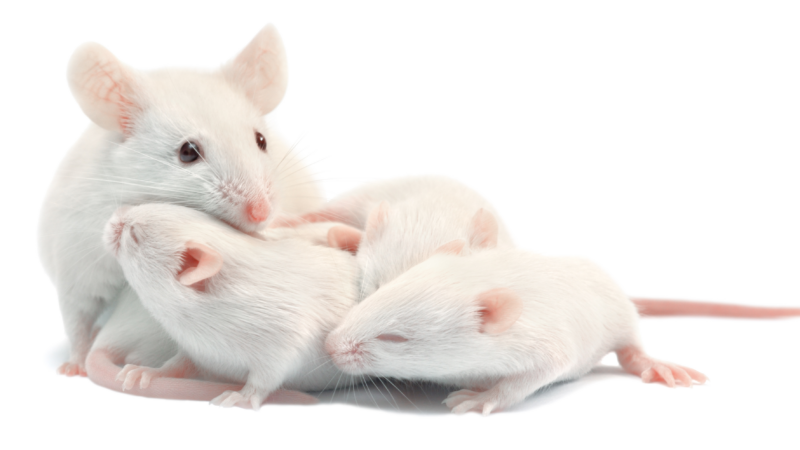Human gene variant alters the voices of mice
Putting the uniquely human version of a certain gene into mice changed the way that those animals vocalized to each other, suggesting that this gene may play a role in speech and language.
Mice make a lot of calls in the ultrasonic range that humans can’t hear, and the high-frequency vocalizations made by the genetically altered mice were more complex and showed more variation than those made by normal mice, according to a new study in the journal Nature Communications.
The fact that the genetic change produced differences in vocal behavior was “really exciting,” says Erich Jarvis, a scientist at Rockefeller University in New York who worked on this research.
Still, he cautioned, “I don’t think that one gene is going to be responsible — poof! — and you’ve got spoken language.”
For years, scientists have been trying to find the different genes that may have been involved in the evolution of speech, as language is one of the key features that sets humans apart from the rest of the animal kingdom.
“There are other genes implicated in language that have not been human-specific,” says Robert Darnell, a neuroscientist and physician at Rockefeller University, noting that one gene called FOXP2 has been linked to speech disorders.
He was interested in a different gene called NOVA1, which he has studied for over two decades. NOVA1 is active in the brain, where it produces a protein that can affect the activity of other genes.
NOVA1 is found in living creatures from mammals to birds, but humans have a unique variant. Yoko Tajima, a postdoctoral associate in Darnell’s lab, led an effort to put this variant into mice, to see what effect it would have.
One part of the study involved recording the mice making ultrasonic chirps. These cries typically occur when pups are separated from their mothers, and later in life males string similar sounds together into songs that they use to woo female mice.
“They’ll sing them to the females as a courtship behavior,” explains Jarvis.
It turns out that genetically altered mouse babies born in the same litter as normal mice chirped differently to get their mother’s attention, the study found.
“The quality and quantity of the chirping was distinctly different in the humanized mice,” says Darnell.
And genetically altered adult males sang notably different romantic songs. “They mix it up more,” notes Jarvis.
What’s more, the researchers note that some of the other genes affected by NOVA1 are known to be related to vocal behavior.
To confirm that this genetic variant was truly unique to modern humans, they did an analysis that checked genomes from extinct human species, the Neanderthals and Denisovans.
What they found is that these ancient lineages lacked this variant, but it was present in the genomes of over 650,000 genomes of modern humans from around the world that are held in databases. Only six modern genomes had the ancient version of NOVA1, but nothing is known about those individuals, the researchers note.
The study intrigued Cedric Boeckx, a researcher with the Catalan Institute for Advanced Studies and Research and the University of Barcelona, who called it “a real advance.”
“It takes a gene that people had already singled out as having a mutation that’s specific to Homo sapiens, that’s not present even in our most closely related relatives, the Neanderthals and Denisovans, and it tries to figure out what this mutation could have done,” he explains.
Previous work looked at this gene in lab-grown mini-brains. Doing this in mice allowed scientists to watch how it affected behavior, but Boeckx cautions that studies in mice have inherent limitations when it comes to understanding speech and language.
“The mouse is not your typical vocal learner,” says Boeckx. “It produces vocalization but they are mostly innately constrained. So it’s not like us.”
Still, he thinks it will make scientists even more interested in probing the effects of this uniquely-human genetic variant as well as how it might interact with other genes known to be involved in language.
After all, he says, humans are special in how we communicate, and knowing the list of genes involved in language “could tell us something about how we came to be who we are.”
Trump says U.S. will resume sending weapons to Ukraine after pausing last week
With Russian attacks escalating, Ukraine is dependent on air defense systems and munitions supplied by western allies to protect Ukrainian cities.
100 years after evolution went on trial, the Scopes case still reverberates
One hundred years ago, the small town of Dayton, Tenn., became the unlikely stage for one of the most sensational trials in American history, over the teaching of Darwin's theory of evolution.
RFK Jr.’s vaccine policy sparks a lawsuit from the American Academy of Pediatrics
AAP and other leading health organizations allege that the health secretary violated federal law when he took the COVID vaccine off the list of recommended shots for pregnant women and healthy children.
The U.S. has millions of old gas and oil wells. Here’s what it takes to plug them up
There was a circle in Maria Burns' yard where grass wouldn't grow and trees died. She knew what it was: An old natural gas well, plugged when she was a little girl, starting to leak again.
Sea lions are released after toxic algae bloom in California
Marine mammal researchers are investigating how sea lions were affected by the longest toxic algal bloom on record off the coast of Southern California. Some sea lions are now being released back into the wild.
The health of U.S. kids has declined significantly since 2007, new study finds
A new study in the journal JAMA finds the health of America's children has worsened across several key indicators over the last two decades. That includes the number of children with chronic diseases.









